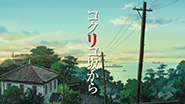 |
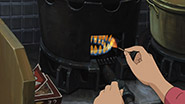 |
 |
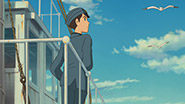 |
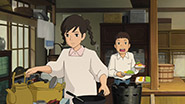 |
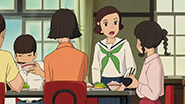 |
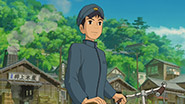 |
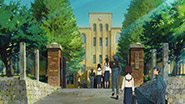 |
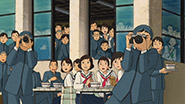 |
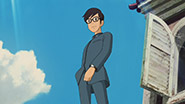 |
 |
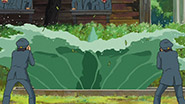 |
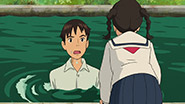 |
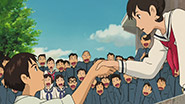 |
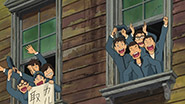 |
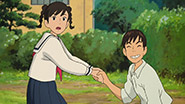 |
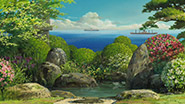 |
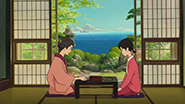 |
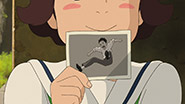 |
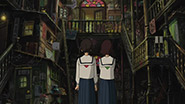 |
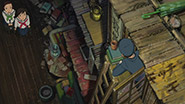 |
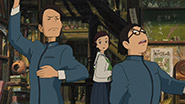 |
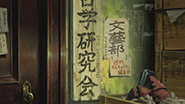 |
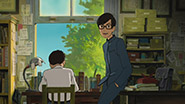 |
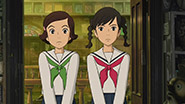 |
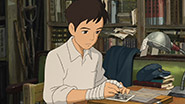 |
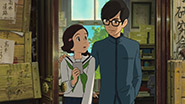 |
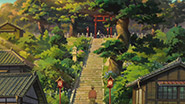 |
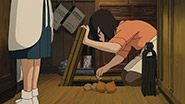 |
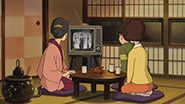 |
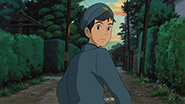 |
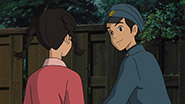 |
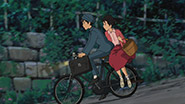 |
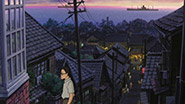 |
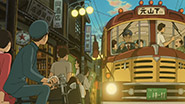 |
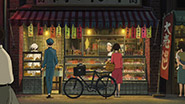 |
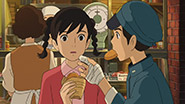 |
 |
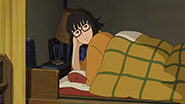 |
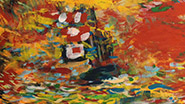 |
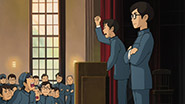 |
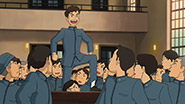 |
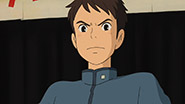 |
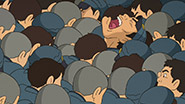 |
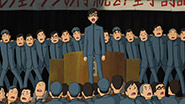 |
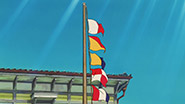 |
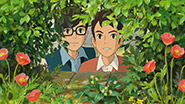 |
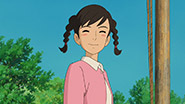 |
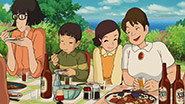 |
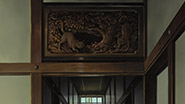 |
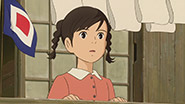 |
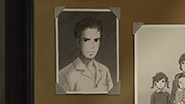 |
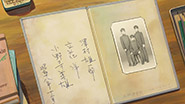 |
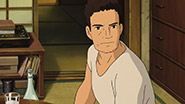 |
 |
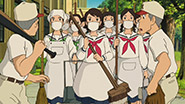 |
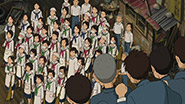 |
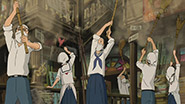 |
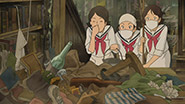 |
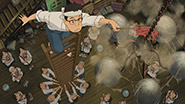 |
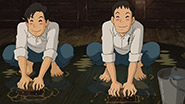 |
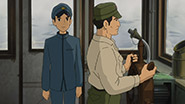 |
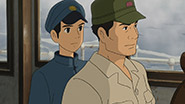 |
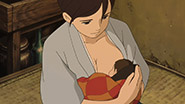 |
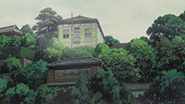 |
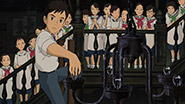 |
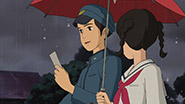 |
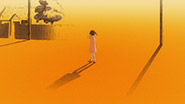 |
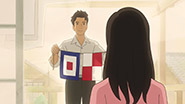 |
 |
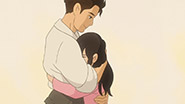 |
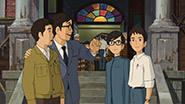 |
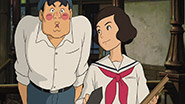 |
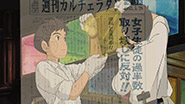 |
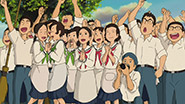 |
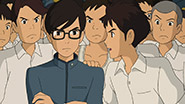 |
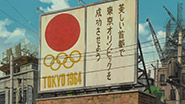 |
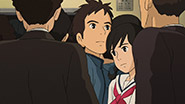 |
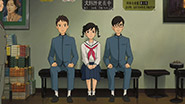 |
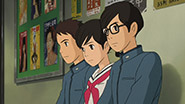 |
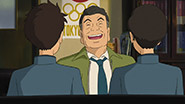 |
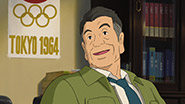 |
 |
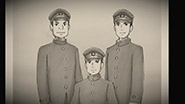 |
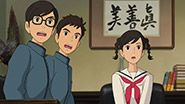 |
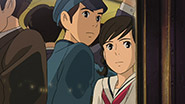 |
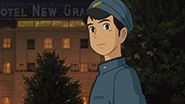 |
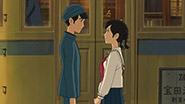 |
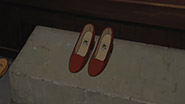 |
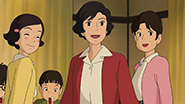 |
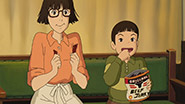 |
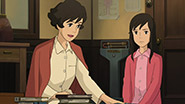 |
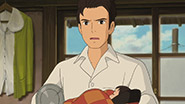 |
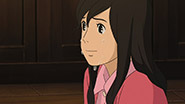 |
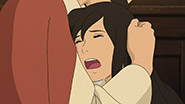 |
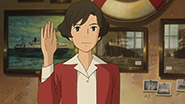 |
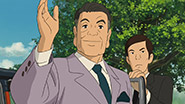 |
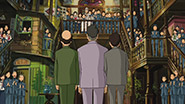 |
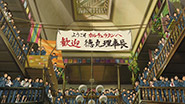 |
 |
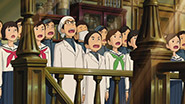 |
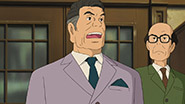 |
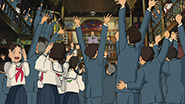 |
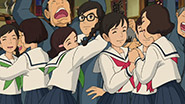 |
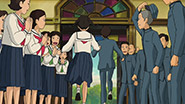 |
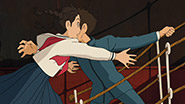 |
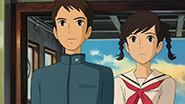 |
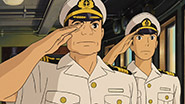 |
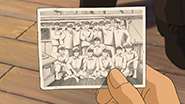 |
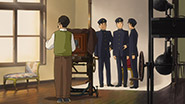 |
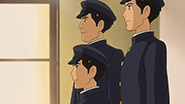 |
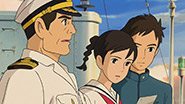 |
 |
 |
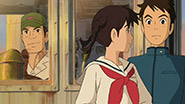 |
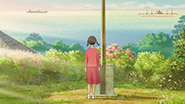 |
“From Up on Poppy Hill”
One thing’s for sure – it can’t be easy being Miyazaki Gorou.
Anyone who pays close attention to anime in its theatrical form has spent plenty of time listening to directors being called “The next Miyazaki”. Makoto Shinkai (cold) and Hosoda Mamoru (a little warmer) seem to be the most popular victims of this particular curse (or recipients of the compliment, depending on your perspective) but in point of fact, there is a next Miyazaki out there – in name and genetics, at the very least. But few seem to want to foist that label on Gorou-sensei, for better or for worse.
If it weren’t hard enough having to bear the weight of the Miyazaki name and legacy, Gorou has also had to deal with some painful personal issues as well. Hayao-sama has stated publicly that he was a terrible father, rarely spending time with his children. And when Gorou’s directorial debut Gedo Senki, an adaptation of Ursula K. LeGuin’s “Wizard of Earthsea”, was being finalized, Hayao was openly critical of his son, saying he wasn’t ready to be a director and he’d been given the honor too soon. He then went on to criticize the film itself, which had to hurt his son pretty badly. Gorou has generally taken the high road and not returned his father’s fire publicly – surely a wise decision – but when Gedo Senki received mediocre reviews and performed poorly at the box office by Ghibli standards, the long knives were quick to appear in the hands of the press.
Publicly at least, father and son appear to have patched things up – or at least declared a cease-fire. For Gorou’s second feature, Kokuriko-zaka kara, Hayao-sensei himself wrote the script – adapted from a 30 year-old shoujo manga by Takahashi Chizuru and Sayama Tetsurou. There was no public bickering during production or after release, and “Poppy Hill” was released to generally favorable reviews and went on to be Japan’s top-grossing film of 2011. It also won the Japanese Academy Award for best animated film of 2011. So all in all, things seem to have improved greatly for the younger Miyazaki. And now that the film has arrived on Blu-ray at last (it will also be receiving a brief U.S. theatrical run this summer), we can see and decide for ourselves.
I wasn’t one of the many piling abuse on Gedo Senki, for the record – it was a flawed film, undeniably, but had some moments of true beauty (and as a huge fan of the books, I was a tough audience). But let there be no mistake, Kokuriku Zaka Kara is clearly better. It’s a Ghibli film through and through, but quite unlike any Hayao-sensei has directed in recent years. It’s fanciful, but not a fantasy. Like it’s soundtrack, there’s an almost jaunty feel to the movie. It’s a straightforward love story, a period piece set in Yokohama in 1963 – a simple film by Ghibli standards, more reminiscent of their earlier works than recent ones, more Takahata Isao than Miyazaki Hayao. It’s fascinating to speculate how much of the true spirit of the film is the manga, how much is the father’s screenplay, and how much the directorial vision of the son.
Matsuzaki Umi (Nagasawa Masami) is a high-school girl, living in the converted hospital that now serves as her family home and a boarding house. Her Grandmother is the dean of the household, Umi’s father having died during the Korean War when his supply ship hit a mine. Also living in the house is younger sister Sora (Shiraishi Haruka), a year behind Umi at school, and elementary student brother Riku (Kobayashi Tsubasa) as well as artist boarder Hiro (Hiiragi Rumi). Umi’s mother is a professor who appears to be rarely at home, traveling the world to further study her unidentified field (in America as the film opens).
This big old house on the hill serves as the backdrop for much of the film, especially in the first half, as mature and responsible Umi’s daily life is portrayed in loving detail. She cooks, she fixes lunches for her siblings, and every day she raises signal flags as a gesture to her father to let him know she still remembers him. Nobody can do old house interiors like Ghibli, and their work is on fine display here – every nook and cranny is lovingly detailed in all it’s grubby beauty. But it’s at Konan Academy High School where much of the larger drama of the second half of the film takes place. Even more photogenic and quirky is the “Latin Quarter”, the ancient clubhouse that serves as a kind of asylum for the semi-wild boys of the school, who engage in all sorts of activities illicit and otherwise inside – and on the roof, and in the pond in front of the building – every activity but cleaning, it seems. It’s a spectacularly weird and delightful scene inside, but one could easily see why the resident girl population finds it rather scary.
All that begins to change when Umi encounters Kazama Shun (Okada Junichi) as he’s diving into said pool from one of the gables (with mixed success). Shun-kun is the editor of the Latin Quarter’s rough but honest weekly newspaper, and the chief co-conspirator with Mizunuma Shirou (Kazama Shunsuke – an interesting coincidence of names, there) in a Quixotic campaign to keep the old building from being torn down to make way for a shiny new one. Japanese student activism in the 1960’s has been rather a hot topic in anime lately, it seems, and this is definitely a fairly innocent depiction of it – the students’ righteous anger is genuine, but there are no violent confrontations with police (or even police) here. As befits the overall tone of the movie, there’s more a feel of a wistful look back at the righteousness of youth (Hayao-sama’s influence might be at play here) than serious social commentary – though we do have full-throated railing against the “tyranny of the majority” and a society that “worships the future and forgets the past”.
There are several different threads playing out in the film’s 90 minutes. There’s the matter of the students’ campaign to save the Latin Quarter, which leads them to Tokyo to appeal to the school’s Chairman (and alumnus) Tokumaru (Kagawa Teruyuki). Shun and Umi’s explorations of their sad and unusual family histories are a focus, and there’s the obvious love story. It becomes part of a somewhat tangled larger plot that’s probably more complicated than it needs to be, but the relationship between Shun and Umi itself works quite well – largely because both are refreshingly free of conventional anime stereotype. Umi is kind and a little naïve, Shun is just a bit impish and impulsive but thoroughly decent and direct, very much like his step-father.
At heart, this movie is a period piece – the music, the look, the emotions all feel very much of the period. It’s nostalgic in a good way, fond without sugarcoating, and the small details – the streetcars, the old office buildings, the kitchen appliances, and especially the Latin Quarter (the scenes where the girls invade for a massive cleanup and redecoration – including the RCA dog in the foyer – are absolutely charming) are truly magical in that special Ghibli way. I quite liked the way class differences subtly intruded itself in the family dynamic as the past was explored by the kids. And while there’s plenty of drama here, it never reaches the level of melodrama – it all feels very everyday and grounded.
In summation, Kokuriko Zaka Kara is a different sort of Ghibli film – different from what we’ve come to expect in recent years, anyway. It won’t rank among the very best of the studio’s impressive catalogue, but it’s both very good in its own right and fascinating as a measure of Miyazaki Gorou’s progress – and future – as a director. I see a young man developing a vision that’s different from his father’s – more puckish, modest and contemplative. It may be that “Takahata Oji-san” was more influential artistically on the boy than the father who was rarely home – that would be a fair guess based on “Poppy Hill”. Gorou-sensei may have no choice about being the next Miyazaki, but he doesn’t have to be The Next Miyazaki – he can find his own way, as Shinkai and Hosoda are doing, though it will be surely be more difficult in Gorou’s case. I think that’s the best thing for both Gorou-san and for Studio Ghibli, and based on Kokuriko-zaka kara, there’s good reason to be optimistic about Ghibli’s future.

I am giving top priority on my plan to watch list.
The big issue with Gorou Miyazaki is that he’s yet to prove himself alone. Gedou Senki was mediocre in comparison to the novel and this one, while is way better, ir more of father Miyazaki, as the whole things has that little tidbits that Hayao usually put in all his masterpieces. The big difference between Gorou and Makoto Shinkai is that Shinkai is not afraid of failing, because that’s how he grows. Gorou Miyazaki doesn’t show that.
I think it’s totally unfair to compare Gorou to Shinkai, whose circumstances couldn’t be more different. Gorou is a product of a studio system with his father at the head, and Shinkai became a filmmaker working completely on his own (quite literally so with his first two feature films).
Gorou has done two films, a pretty good one and a very good one. If “Poppy Hill” had been a disaster he would have gotten the blame and everyone would have said “he even ruined Hayao’s script”. So I’m going to give him credit for its success – and I think it had a very different tone and look to a Hayao film.
I wouldn’t call Gedou Senki a train wreck but it was clearly not up to the usual high standard from Ghibli, not even close. Kokuriko zaka kara is without a doubt a much stronger effort and Gorou Miyazaki definitely deserves props for that 😉
So much to watch. I haven’t watch the last 3 that came out from Ghibli yet D: must catch up. Thanks for this post. Now I can plan when I can watch it
Still waiting for it. I absolutely love that you’ve covered this Enzo. Studio Ghibli has been a love of mine for a long time; it was what introduced me to the world of “anime.” My user name is derived from the protagonist of Spirited Away.
I would point out though that I can think of a number of occasions in which Gorou did not take the high road and did publicly attack his father, and also I remember him dismissing Joe Hisaishi as a musician (poor choice, in my opinion.) Not to crucify Gorou, but I just wanted to point out that both he and his father acted shamefully during Earthsea. It’s great to see them come together for this film. I will post my reactions when I watch it.
Kinda off-topic, but Makoto Shinkai as the “next Miyazaki” ? Were there really people saying that ? I find it hard to believe, to me these two (immensely talented) directors give a completely different feeling, both artistically speaking and story-wise.
How much time you got? 😉
Google will reveal many, many “Next Miyazaki” and “New Miyazaki” citations if you want to follow that lead. I don’t agree with it myself – read the post I did on Hoshi o Ou Konomo if you want to know more detail on how I feel about the comparison.
Hmmm… Takahata’s movies were my preferred ones, specially Omohide poroporo…
I’ll give this one a chance.
Yay! Thanks for this post. Love seeing screenshots of Ghibli films because each is a masterpiece in color and composition, plus I can get to see all of the details. I love fresh and pure love stories, but I what I’m really excited for is the upcoming Taketori Monogatari / Princess Kaguya, which is directed by Takahata. I’m getting Mononoke-hime / Sen to Chihiro vibes from it.
I loved this movie. It’s simple and awesome. Went to see it with my bro and sis. Come to think of it I haven’t been to the cinema since, it was in December. Well anyway.
You probably know most of what I’m about to say, but I saw an interview of Miyazaki Gorou-san about this movie when it was released here. About the movie, he’s saying that unlike with Gedo Senki where he was free to do it however he wanted, since Miyazaki Hayao launched the project and wrote the script for Kokuriku Zaka Kara, he had a definite idea in mind of what every scene would be like, and he didn’t leave him a choice, he had to do them that way. He also talks about the producer Suzuki Toshio-san, about the scene where Show Spoiler ▼
, he said he had to redo it a lot of times, and showed it to Toshio-san every time, until he could see a glimpse of satisfaction on his face.
Besides the movie, he also talked about how he’s one of the very few who became an animation director directly, without doing in-betweens and etc in the first place, thanks to his father. And that wasn’t what he planned to do in the first place. He was an architect. He’s not participating in the next two movies Studio Ghibli will be releasing so he doesn’t really know what will he do now. (the interview is from November though so yeah)
Also, he calls his dad Miyazaki Hayao-san. Each time I think about it, I kinda feel bad for him.
Good post, Rock. Here’s how I see it – there are plenty of people in Japan who can design buildings. There’s one Miyazaki Gorou. Takahata-san is 77 years old, and Hayao-san threatens to retire every time he finishes a movie. If Ghibli is going to survive as a studio, Gorou-san is going to be a part of it. But in the end, that’s up to him.
I think so too yeah.
I think there are many talented individuals in Ghibli who could be worthy successors. Yonebayashi Hiromasa who directed Karigurashi no Arietti did an excellent job.
Regardless from what really happened when Goro Miyazaki-san said that he was not feel as free in making From Up on Poppy Hill compared to Tales from Earthsea, I want to say that I also enjoy watching this film (actually, I enjoyed watching Tales from Earthsea too altough the story is a bit confusing). It’s nostalgic story (this is why I like this movie, it’s heart-warming) is simple but enjoyable. Images and backgrounds are detailed and beautiful. The jazzy soundtrack (I like jazz music) is also fit the atmosphere of the story, even the old song (whom already appeared several years ago before I was born in ’90) “Ue wo Muite Arukou” or “Sukiyaki” and “Sayonara no Natsu” add more the nostalgic nuance which makes me feel back to the past.
I just watched this and I really loved it! You’re right about the nostalgia. I really love the music they used, especially Sukiyaki.
Ghibli really must have an army of dedicated and talented animators. It’s been a while since I last watch a Ghibli movie. I almost forgot how amazing they are visually. Those tokyo scenes were really nice. What I notice in this movie is that there wasn’t a scene that really stood out. It was consistent overall.
This movie is absolutely beautiful. All the characters, even the minor background ones, are charming and unique. Thank you for recommending!
It’s been a long time since i’ve watched a Ghibli film… will try and watch this… ^____^
I loved this movie. Nice and simple. The colors are just pleasing to the eye. And the music is soothing. The characters are very likeable and refreshing as well.
Would love to see more movies like this. Any recommendations?
“My Neighbors the Yamadas” directed by Takahata-sensei is an extremely easygoing and likable Ghibli movie, though the animation style is very different from this. There’s not too much in the modern Ghibli catalogue like “Poppy Hill” IMO. You might try “Summer Days With Coo”, though that’s not Ghibli, has a modern fantasy setting and a bit more drama.
There are a number from the old Ghibli catalog that are of the similar vein. On top of my head, Mimi wo Sumaseba (Whisper of the Heart), Omoide Poro Poro (Only Yesterday) or even Tonari no Totoro. Mimi wo Sumaseba is a personal favorite of mine and it’s definitely one of the more under-appreciated Ghibli work 😉
I watched it last night and I liked it. Maybe it is not as great as other Ghibli movies, or at least I didn’t feel it like that, but it’s pretty enjoyable and nice =)
Thanks for posting this! I remember hearing about this film when it first came out, but no subs were available at the time. I had completely forgotten about this film until your review!
It was an enjoyable watch. I liked it for all its simplicity, and the characters were likeable. It was certainly different from the more popular Ghibli fantasy films. The soundtrack complemented well with the period that the film was trying to evoke, and as expected, the animation and artwork were outstanding.
I enjoyed watching the students rally together to clean the clubhouse and fight for its preservation and the unraveling of the love story, but as stirring as these scenes were meant to be, I wasn’t as moved as I expected I’d be considering what was unfolding in front of my eyes. Not to say that it was a bad film, because it wasn’t. I groaned at the “revelation” between Umi and Shun, though.
I’d say it was a pretty good film. I can’t think of anything outright “bad” about it. It’s just that I don’t think I’ll be remembering it as one of my all-time favorites in the future. I might be biased a bit, as I haven’t loved any Ghibli film after Spirited Away, which I hold in high regard.
I actually enjoyed this film because it definitely reminded me of “Only Yesterday” and “Whisper of the Heart”.
Despite how much I love the fantastical styles of “Princess Mononoke”, “Spirited Away”, “Castle in the Sky” and the like, OY and WOTH are my favorite Ghibli works. They were the kind of films that made you think, “They actually made a movie about this?” In a way, they took a simple and uneventful subject and somehow brought life into it, and it turned out to be a really good story. It always makes me sad when Ghibli fans have never even heard of or seen OY and WOTH.
I like this movie as it’s simple tale, something like whisper of the heart and only yesterday. Glad they can still pump stuff like this out instead of just more fantay epics. They still got the diversity and talent to branch out a bit. Although I wouldn’t mind another fun movie like kiki or porko rosso. Even arrietty was a bit more toned down and simplistic which sometimes can do more then shoving a particular theme down our throats.
I’ve just watched the movie and I love it.it ‘s romantic ,I think, simple ,and it can please the secondary girls who love romance